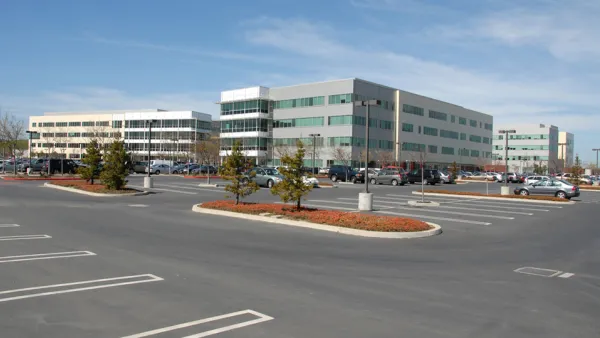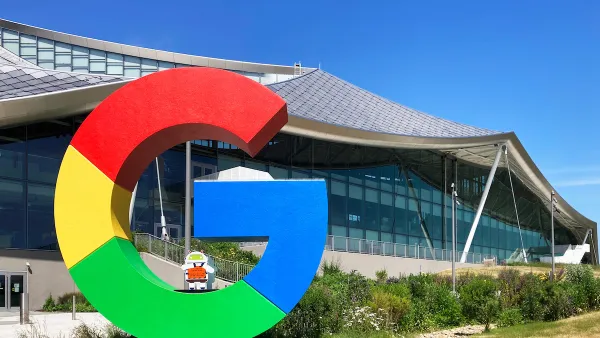The city of Mountain View chose to allot most of the redevelopment rights in its much sought-after North Bayshore area not to the city's largest employer and taxpayer but to LinkedIn's more conventional proposal.
"In a blow to Google’s expansion plans, the Mountain View City Council voted to give the search giant roughly a quarter of the office space it had requested for the project, and instead awarded the lion’s share of the city’s future office development –- 1.5 million square feet –- to LinkedIn, writes Conor Dougherty of The New York Times Bits blog which "reports on the technology industry, including start-ups, the Internet, enterprise and gadgets."
The vote was part of a years-long plan for how to redevelop Mountain View’s North Bayshore area, a mass of low-slung office parks that surrounds Google’s headquarters and is separated from Mountain View proper by Highway 101.
Perhaps the rejection should not have been all that surprising. In March, Planetizen editor James Brasuell posted that Google's proposal "is likely to aggravate an increasingly testy relationship between the company and community leaders who fear the company is overrunning their small city," also based on a piece by Dougherty.
For LinkedIn, it was a David vs. Goliath victory that was the result of several savvy moves and a project that was ambitious but not too ambitious. [In addition,] one of LinkedIn’s selling points was that it would “preserve business diversity,” meaning it would reduce Mountain View’s dependence on Google.
Compared to Google’s clear, space-age headquarters [known as the Googleplex], LinkedIn’s proposal, called the Shoreline Commons, was quite modest. It would be a cluster of offices and retail, including a movie theater and a gym with a pool and a basketball court, along with several bike and pedestrian paths. But modesty was part of the pitch.
"The overriding principal [sic] is we took the precise plan, and the city wanted this kind of project at the gateway: Entertainment, mixed use. What we tried to do is deliver that," said Jim Morgensen, LinkedIn's real estate chief, in an earlier chat with the Silicon Valley Business Journal.
LinkedIn's representative told the Mountain View City Council, "We are doing this without asking for any variances in heights or density, with a project that can be built now with existing technology and union labor,” writes Dougherty. "It was a not-so-veiled reference to Google’s plan, which required height exceptions and engineering technologies that have not yet been developed."
Housing Included
LinkedIn also made the savvy move of partnering with an affordable housing developer, which aims to build new housing projects nearby. Google also had plans to develop housing and is still likely play a role in whatever housing plan emerges, as it owns most of the land in North Bayshore.
Has Google outgrown Mountain View to house its headquarters? See Jason Henry's eight-photo slide show of the suburban city for The New York Times.
San Francisco-based Heather Smith pens several excellent pieces about Google's Mountain View campus, its expansion proposal, and the basic nature of suburban office parks for Grist.
FULL STORY: Google Loses to LinkedIn in Silicon Valley Headquarters Pitch

Analysis: Cybertruck Fatality Rate Far Exceeds That of Ford Pinto
The Tesla Cybertruck was recalled seven times last year.

National Parks Layoffs Will Cause Communities to Lose Billions
Thousands of essential park workers were laid off this week, just before the busy spring break season.

Retro-silient?: America’s First “Eco-burb,” The Woodlands Turns 50
A master-planned community north of Houston offers lessons on green infrastructure and resilient design, but falls short of its founder’s lofty affordability and walkability goals.

Test News Post 1
This is a summary

Analysis: Cybertruck Fatality Rate Far Exceeds That of Ford Pinto
The Tesla Cybertruck was recalled seven times last year.

Test News Headline 46
Test for the image on the front page.
Urban Design for Planners 1: Software Tools
This six-course series explores essential urban design concepts using open source software and equips planners with the tools they need to participate fully in the urban design process.
Planning for Universal Design
Learn the tools for implementing Universal Design in planning regulations.
EMC Planning Group, Inc.
Planetizen
Planetizen
Mpact (formerly Rail~Volution)
Great Falls Development Authority, Inc.
HUDs Office of Policy Development and Research
NYU Wagner Graduate School of Public Service



























